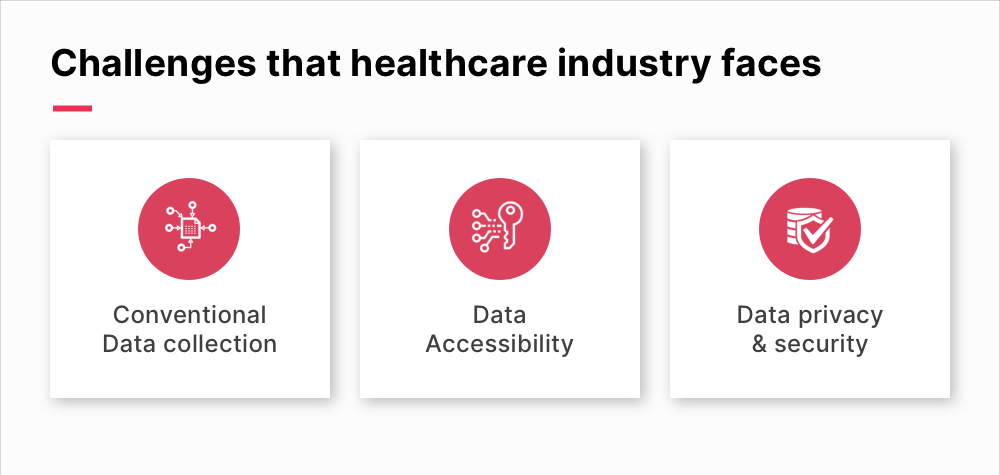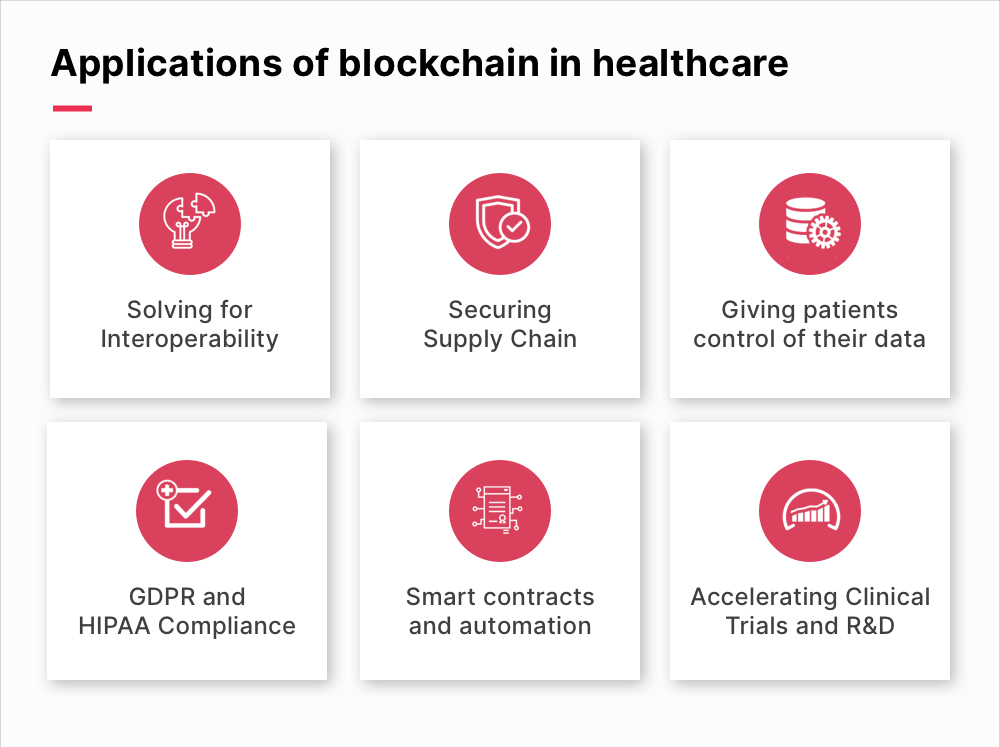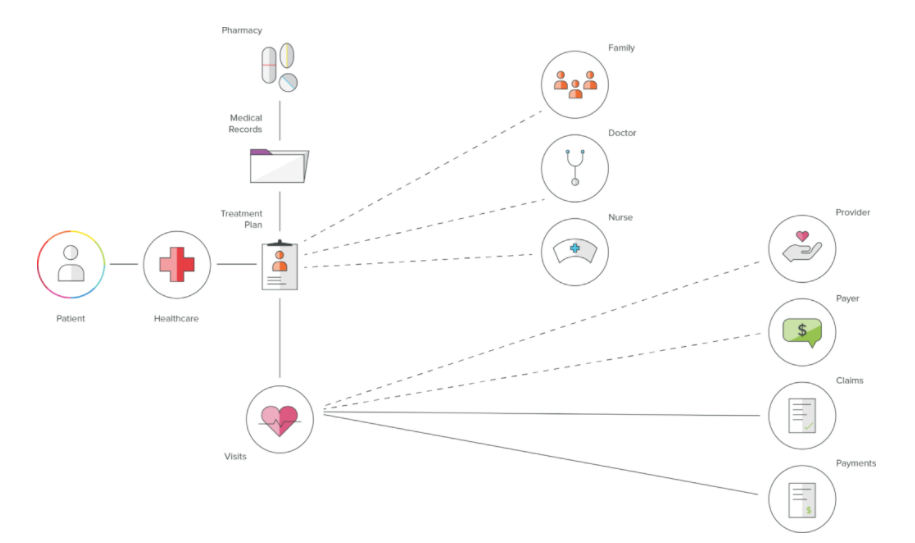In 2017, there was a nationwide crackdown in the U.S. on healthcare fraud, in which around 412 healthcare professionals were arrested for doing fraudulent transactions worth $1.3 billion. According to a global study conducted by IBM and Ponemon Institute, in 2017, the healthcare industry was a major sufferer of such incidents, with the highest toll in terms of the cost of breaches, the cost of breaches in healthcare was 2.5 times the global average when compared to other industries.
These issues have brought the entire world face to face with the glaring need of a secure healthcare infrastructure. While the healthcare industry has made advancements in areas pertaining to research, diagnosis and even efficient cure, it is at the back seat when it comes to creating a secure, unified healthcare system.
Challenges of the healthcare sector that blockchain technology can address of the current challenges that healthcare industry faces are:
- Prevalent conventional Data collection, lack of a secured infrastructure which can allow a fast interoperability of transactions between various data points
- Accessibility to PHI (protected health information) sets limit progress in research.
- Data privacy and Data security
Let’s dig deeper. One of the major setbacks that the healthcare industry faces is the scattered patient data across channels, departments and systems. This prevents from crucial data to be accessible when needed. With multiple players and abrupt processes current healthcare system isn’t unified. Moreover, data security breaches also bring to light the inadequacy of the system in handling the exchange of information securely.
All of this is preventing healthcare organizations from delivering appropriate patient care and high-quality services. Let’s look at some statistics :
- Nearly half of clinical trials in the US are unreported
- Up to 40% of healthcare provider data records are filled up with errors or misleading information
- Healthcare data breaches in organizations are estimated to cost around $380 per record in the current times. 2.5 times the global average when compared to other industries.
Outdated systems for keeping patient records is a major issue. These systems hold local records of the patient data at multiple touch points. This scattered availability of abrupt data can make the diagnosis difficult and time-consuming for the doctors, and tedious for patients. A lot of new-age technologies are helping the industry in dealing with and minimizing these challenges and blockchain is one of the promising ones amongst them.

As stated by BCG, healthcare experts are looking to blockchain as a possible solution for some of these critical issues that the healthcare industry in facing. They predict :
- Blockchain can pave way for powerful new capabilities and a potentially massive disruption of current approaches to services, care, and accountability.
- Blockchain has the potential to speed up and improve R&D, care delivery, and care management, and to reduce costs.
What is blockchain technology?
Blockchain technology, is a distributed ledger based system where the information is stored in a distributed ledgers and can be accessed with a key, which makes the data immutable. The cryptographic and multi-participant validation system of blockchain makes it one of the technologies that various industries look forward to in terms of data security.
While the major use cases of blockchain technology has been talked about in the financial services other industries are also exploring the possibility of deploying blockchain to increase efficiency and security, and healthcare could soon be reaping the benefits of this technology in full scale.
The three basic principles on which blockchain technology is based on can help in overcoming the above-mentioned challenges. These three principles are:
Private key cryptography — Use of a secure and private key is as a variable along with an algorithm to encrypt and decrypt the code. While the algorithm is open the key is not revealed and is secret. Creating a reference of the secure digital identity, while the transactions are on the open network.
Distributed ledgers — A distributed ledger is referred to as a network of shared records. This ledger is updated in real time and the authority is decentralized, where network of participants keep the ledger updated. Any changes made in the ledgers reflects in the network in almost real time.
Authentication — In a Blockchain, all the transactions are authenticated before getting added to the chain. The algorithms used in blockchain validate and verify all the transactions. After the encryption, this information is digitally signed and stored post which its authenticity is sealed.
Applications of blockchain in healthcare
Here is how blockchain technology can reshape various aspects of the healthcare ecosystem to create a more secure and efficient system.

1. Solving for interoperability in healthcare ecosystem for EMR, EHR, and PHR data
Blockchain can help healthcare providers in creating the next-generation system coupling health data with decentralized, distributed, and immutable qualities. According to IDC, Blockchain’s interoperability could underpin data exchange, serving as an alternative to today’s health information exchanges (HIEs); essentially, it would act as a network for transmitting secure, real-time patient data for healthcare providers, including the pharmacies, insurance enterprises and clinical researchers.
Booz Allen recently helped the US Food and Drug Administration’s Office of Translational Sciences to develop and implement blockchain technology based data sharing solutions. It eased the process of identifying safety signals in FDA and non-FDA safety report databases for the FDA.
LA based start-up Gem uses blockchain technology to address the trade-off between personalized care and operational costs by connecting the healthcare ecosystem to universal infrastructure. They create global identifiers to link together data belonging to a person or asset. It eliminates time consuming reconciliation, providing real-time transparency, reducing risk and creating better outcomes.

2. Securing supply chain
Blockchain technology can be used to reshape the supply chains across the healthcare sector. Transactions on blockchain are recorded in a chronological, unalterable, validated ledger through which blockchain can help supply chain vendors in healthcare like pharma and medtech enterprises track the journey of raw materials, compounds, or components at individual step of the supply chain, from the source to company facilities to the consumer or patient.
As the supplier logs in information into a blockchain ledger, the data can be accessed by the stakeholders, where they can validate and identify counterfeit materials, malfunctions, or environmental breakdowns thus confirming a tamper-free cold chain.
The MediLedger Project, backed by pharma giants like Genentech and Pfizer, has piloted a program using blockchain tools provided by Chronicled, a US-based startup, to track medicines.
Modum.io combines sensors and blockchain technology to monitor products requiring cold-chain handling to improve pharma supply-chain efficiency. BlockVerify tracks QR codes on packaging on a blockchain (for pharmaceuticals, precious stones, electronics, and luxury items), to authenticate products.
3. Giving patients control of their data
Blockchain technology can enable patients to take control of their data. Technology has made it possible to record nearly all the medical data of a patient. Each of the transactions can be maintained on a blockchain record, which could enable patients to maintain a complete audit trail of every doctor, provider, payer, medical device, health information exchange (HIE), or any person or entity that has had access to their data.
This access will also give patients diagnosis and treatment related benefits. It will also help in maintaining data security in case patients inadvertently share, or companies gain access to, more data than is desired or intended.
Some enterprises are already working in this direction. For e.g. Google’s DeepMind, is working with Britain’s National Health Service (NHS) on developing a blockchain distributed within a closed network of participants to create robust audit trails that track exactly what happens to personal data. The objective is to enable the NHS and also patients to track personal data access and use in real time.
MIT Media Lab has developed MedRec, which is a decentralized record management system for EMRs (Electronic Medical Records) that uses blockchain technology to manage authentication, confidentiality, accountability, and data sharing. MedRec is the combination of a social need with a technological enabler: a system that prioritizes patient agency, giving a transparent and accessible view of medical history.
4. Point-of-care genomics management
Point-of-care tests are defined as “medical diagnostic tests”, performed at or near the site of patient care. These tests support clinical decision making by delivering results in real time (usually in less than 90 minutes). Most available POC genomic devices provide limited results indicating the presence or absence of a certain pathogen or antimicrobial resistance gene. NorthShore University HealthSystem has built a digital platform called Flype that delivers genomic data to providers at the point of care. It is an informatics platform that allows the organization to securely accept data from multiple sources, send orders to a variety of destinations, and perform secondary analysis and annotation of genomic data.
During the pandemic, the platform has been able to translate data as well as lab and diagnostic tests across systems – including COVID-19 test results.
Nebula, a Miami based organization, uses Blockchain technology to offer users permanent ownership of their genomic data on a publicly-readable ledger.
5. GDPR and HIPAA compliance
FDA states for electronic data exchange -’ 21 CFR Part 1’1 needs to be followed. It is mandatory for healthcare enterprises to be HIPAA compliant in the U.S. and GDPR compliant when it comes to dealing with patients based out of Europe.
The HIPAA Privacy Rule and the HIPAA Security rule, establish national standards for the protection of certain health information. HIPAA Security Rule, are national set of security standards, that protect certain health information held or transferred in electronic form. The Security Rule operationalizes the protections contained in the Privacy Rule by addressing the technical and non-technical safeguards.
According to GDPR – the definition of of personal data covers any information associated with an “identified or identifiable natural person,” including computer IP addresses, photos, credit card data and the like. Further, GDPR gives the patient the right to erasure, which implies that a patient can choose to have their data erased from the records of the enterprise.
Both HIPAA and GDPR strengthen the security requirements to ensure protection of patient’s data by implementing pseudonymization and redundancy, along with routine pen testing and intrusion detection measures. And, under both the rules, organizations will need a continuous process to evaluate its security measures. Blockchain allows a creation of immutable environment which is auditable and security friendly.
6. Smart contracts and automation of manual processes
As stated earlier in the article, one of the major issues that the healthcare sector faces is interoperability, and the outdated healthcare repositories is a critical aspect of that. Blockchain technology can be a solution for this issue by the means of ‘smart contracts’ – scripts that self-execute based on predetermined rules.
For instance, once a patient fills out paperwork at a physician’s clinic then, a few months later, say he goes to a different physician or a specialist, a smart contract could automate the transfer of patient data based on pre-set rules that the patient could control.
According to Mutaz Shegewi, IDC’s research director for provider IT transformation strategies,
“One big pain point for providers and payers is preauthorization and availability checks – running processes to ensure a patient is eligible for a care option or treatment or intervention”.
Blockchain enabled smart contracts can with predetermined rules can help in automating the process, make it error free and efficient. Further, these smart contracts can also help in fastening the payment process and reduce any point of contention between patients, healthcare provider and insurance agencies due to a single source and standardization of the transaction data between the three parties.
7. Accelerating R&D
Research and development is one of the major disciplines in healthcare. With not just healthcare enterprises but technology giants also entering this area, investments in R&D has seen an upward trend in the past few years and the sector is poised to become largest R&D-spending industry by 2020. Blockchain technology can help in streamlining the R&D processes, make it more cost effective and boost innovation. Here is how it can help achieving all of this –
- Blockchain technology can automate the validation, coordination and maintenance of adherence to trial protocols by pharma and medtech companies.
- It can ease the process of recruitment where patients or volunteers can self-identify and enroll for trials and the system can automatically assess and verify their eligibility.
- Data gathering process of researchers can be made easy and error free. Since blockchain technology can help store all data in a consistent, accessible infrastructure in which patients grant access to others by sharing public and private keys; the clinical data gathered will be reliable and verified.
All of the above can enable faster and cost-efficient completion of trials through more efficient patient recruitment and data sharing across multiple sites, decreased preprocessing of data, and faster regulatory approvals. Academic institutions across the globe pharmaceutical enterprises are exploring ways to realize this potential. For example, researchers at MIT are developing the OPAL/Enigma platform, which enables parties to jointly store and analyze data with complete privacy.
Some blockchain companies reviving healthcare industry capabilities
#1 Akiri: Akiri operates on a network-as-a-service model specifically for the healthcare industry. It helps protect patient health data when transporting it. Akiri ensures that healthcare data remain secured and shareable only with authorized parties.
#2 Guardtime: Guardtime is helping healthcare companies and governments implement blockchain into their cybersecurity methods. It has recently partnered with Verizon Enterprise Solutions to deploy several platforms based on Guardtime’s Keyless Signature Infrastructure (KSI) Blockchain.
#3 Avaneer: Avaneer uses blockchain technology to improve healthcare efficiency by utilizing a public ledger to support better claims processing, secure healthcare data exchanges, and keep provider directories maintained and up-to-date.
#4 Robomed: Robomed provides a combination of AI and blockchain to offer patients a single point of care. It uses chatbots, wearable diagnostic tools and telemedicine sessions to collect patient information and share it with the patient’s medical team.
#5 Embleema: Embleema is a virtual trial and regulatory analytics platform that uses blockchain to fast track drug development. It stores secure, untampered data of users in Embleema’s blockchain and then analyzes the data.
A blockchain enabled future of healthcare
According to a recent article by IDC, investments in blockchain remain stable in Europe even a year after the pandemic. From a technology perspective, IT services and business services (combined) will account for more than 65% of all blockchain spending in 2021, increasing their share throughout the forecast.
However, there is still a massive 80% who won’t be leveraging the technology. The prima facie reason for this is that the technology in itself is at a nascent stage and its potential has been seen only in the BFSI sector thus far. Other industries, will take some time to warm up to the technology. Like any other new technology blockchain also comes with its fair share of challenges which will impede its deployment. According to a PwC research, some of these are:
- Lack of trust and uncertainty about the technology – 47% of healthcare of companies say lack of trust a barrier to implementing blockchain and 39% feel regulatory uncertainty is limiting its adoption.
- 61% of blockchain projects challenged by lack of blockchain expertise.
- 31% of healthcare companies say cost of deployment is also a major roadblock to adoption of blockchain technology.
While there are obvious challenges while it comes to leveraging blockchain in healthcare, now. The Industry does realises the potential it has in reshaping and changing the redundant and outdated processes. For the very same reason, it is expected that by 2025, blockchain in healthcare will grow over $5.61 billion and researchers project that 55 percent of healthcare applications will have adopted blockchain for commercial deployment.
For the healthcare industry, while the perfect application of blockchain seems futuristic, conversation around its potential and deployment at certain primary levels like creating smart contracts, should happen now to reap the benefits of blockchain in the near future.





